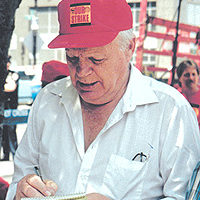Corporate corruption that has made headlines since Enron’s collapse took on a new dimension last week when the Senate Permanent Subcommittee on Investigations (PSI) found that two of the nation’s largest banks were involved in accounting schemes that allowed Enron to list loans as business income in its balance sheet.
In his opening statement to a hearing, Sen. Carl Levin (D-Mich.) charged that Citigroup, ranked number seven on the Fortune 500 list, and JP Morgan Chase, ranked 21, knowingly gave “help and assistance” to Enron’s accounting deceptions resulting in the loss of millions of dollars for 401(k) retirement plans and union and private pension funds.
Levin said the schemes were a phony “prepay” arrangement that enabled Enron to “artfully disguise” loans as business income rather than debt. He added that Enron used circular three-way deals in which Enron received money upfront in exchange for delivery of natural gas at a later date. It enabled the company to show increased business activity, increasing its credit rating and stock value. However, in another accounting gimmick, Enron was simultaneously treating the prepay transactions as loans on its tax returns in order to claim the interest expense as a business transaction.
Levin, who chairs the PSI, said that committee investigators had uncovered evidence that Enron had the “help and knowing assistance” of JP Morgan Chase and Citigroup in developing accounting schemes that “pile deception upon deception.”
According to senate investigators, Citigroup and JP Morgan Chase were the biggest participants in Enron’s phony prepay schemes by arranging for Enron to carry out its activities using offshore shell companies the banks controlled. Levin said Mahonia and Mahonia II, two of the most-often used fake organizations “have no employees and no offices and operate in secret jurisdictions that make it tough to uncover or understand their relationships to the banks behind them.”
Committee investigators found the record of one such transaction in which JP Morgan transferred about $350 million to Mahonia, which simultaneously transferred the same amount to Enron. In another instance, the same bank set up Mahonia II for the sole purpose of “entering into arrangements that will assist the Chase Manhattan Bank (since merged with JP Morgan) in providing finance for major U.S. oil and gas companies.”
Levin said he hoped the hearings would “cut through the darkness … Central to the issues today is evidence indicating that Chase and Citicorp knew what Enron was doing, assisted Enron in the deceptions and profited from their actions.” The banks reaped steep fees and interest payments from the loans. They also marketed the prepay model to other clients and, in the case of Citigroup, successfully pitched it to at least three other firms.
During their seven-month investigation, the committee’s staff examined a million pages of company records, including internal e-mails and telephone conversations. Robert Roach, the committee’s chief investigator, told the subcommittee hearing on July 23 that investigators had examined documents from a half dozen financial institutions, some of whom “not only knew but actively aided Enron in return for fees and favorable consideration in other business dealings.”
He added that this “see no evil” approach enabled Enron to arrange for at least $8 billion in unreported loans between 1992-2001, with JP Morgan Chase involved in a dozen questionable transactions and Citigroup involved in 14 others.
Among the e-mails uncovered by investigators was one circulated at Chase saying, “Enron loves these deals” because they enable the company to hide debt. An Arthur Andersen e-mail says, “Enron is continuing to pursue various [ways] to get cash in the door without accounting for its debt.” When Enron filed for bankruptcy on December 2, 2001 it had about $5 billion in outstanding prepays – read “loans” – that were virtually unknown to the company’s creditors or investors.
Roach told the committee that Enron is not the only company obtaining loans and recording them as cash flows from operations. “Major financial institutions are knowingly assisting and even promoting such transactions, which would not be possible without their willingness s to provide the funds, the paper work and a sham offshore trading partner.”
The author can be reached at fgab708@aol.com









Comments